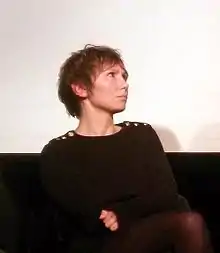Dinara Drukarova
Dinara Anatolyevna Drukarova (Russian: Динара Анатольeвна Друкарова; born 3 January 1976) is a Russian actress.
Dinara Drukarova | |
|---|---|
 Dinara Drukarova (on the right) in 2016 | |
| Born | 3 January 1976 |
| Nationality | Russian |
| Occupation | Actress |
| Years active | 1989-present |
Life and career
Drukarova was born in St. Petersburg, and still lives there half the year, spending the other half in France, where she tends to pursue most of her film roles. She made her debut in the 1989 film, It Was Near Sea, but it was her second film, Don't Move, Die and Rise Again!, which first saw her receiving attention, when the film won the Golden Camera at the 1990 Cannes Film Festival.[1]
She starred in a number of minor Russian films in the early 1990s, but began to pursue European (and predominantly French) productions after making her first film there, The Son of Gascogne (1996). She made a brief foray into music soon after, recording a not widely released single, "Made in Leningrad". However, she has remained focused on acting, and not recorded anything since.[2]
One of Drukarova's few Russian films during the latter half of the 1990s was the controversial 1998 cult film Of Freaks and Men, in which she played the female lead role of Lisa. This performance saw her nominated in the category of "Best European Actress" at the 1998 European Film Awards. She was subsequently interviewed in a number of prominent French magazines, including Elle, Premiere, and Vogue. In addition, Drukarova was appointed as a member of one of the juries at the 1998 Strasbourg European Film Festival.[1]
Over the next few years, Drukarova featured in several more minor films before winning the key part of Ada, a Georgian woman, in the 2003 film Since Otar Left. The film received a wide arthouse release in several countries, winning the Critics Week Grand Prize at Cannes, and substantially increased her profile internationally. In 2004, she was featured in the music videos 'Club foot' and 'L.S.F.' by British band, Kasabian. Her most recent project, as of January 2005, is the 2004 film, Automne, which was not widely distributed, with the exception of the film festival circuit.
Selected filmography
- Freeze Die Come to Life (1989)[3]
- Le Fils de Gascogne (1996)
- Of Freaks and Men (1998)
- "Since Otar Left" (2002)
- Silent Voice (2009)
- 360 (2012)
- Amour (2012)
- My Golden Days (2015)
References
- "Festival de Cannes: Freeze Die Come to Life". festival-cannes.com. Retrieved 28 June 2015.
- Динара Друкарова
- "Freeze. Die. Come to Life". Santa Cruz Sentinel. 17 May 1991. p. 54. Retrieved 12 September 2014 – via Newspapers.com.

